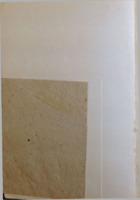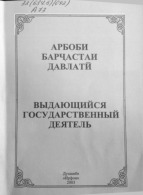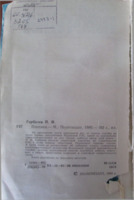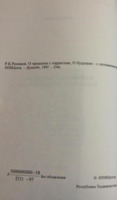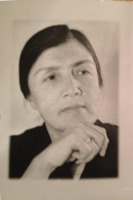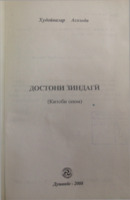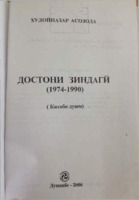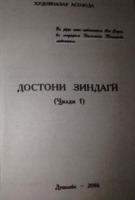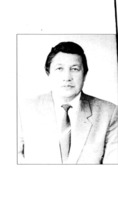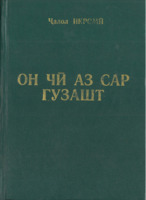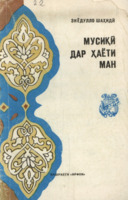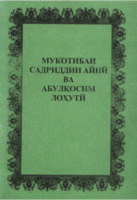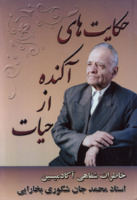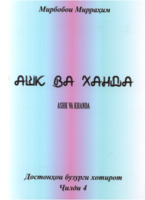Browse Documents (15 total)
Видный ученый-экономист Средней Азии (К 70-летию со дня рождения И. К. Нарзикулова) A prominent Economist of Central Asia: A 70th Birthday Festschrift for I. K. Narzikulov
From the publisher: В настоящей брошюре публикуются материалы юбилейной научной конференции, посвященной 70-летию со дня рождения академика АН Таджикской ССР, заслуженного деятеля науки республики, профессора ИХ. Нарзикулова. В ней характеризуются роль и значение И.К. Нарзикулова—первого ученого-экономиста Таджикистана, основателя экономической науки в республике, крупного организатора научных исследований, инициатора и организатора подготовки в Таджикистане экономистов высшей квалификации, а также его разносторонняя государственная и общественная деятельность. Брошюра рассчитана на широкий круг читателей.
Ibadullo Narzikulov (1909-1974) was a Tajik planner, economist, and academician. Born in Samarqand, he studied at the Leningrad Polytechnic Institute and then worked in a number of planning positions before earning a graduate degree in economics. He played a crucial role in establishing the discipline of economics within Tajikistan and in ensuring that academic economists were consulted on questions of planning. This volume of reminiscences was put together by his colleagues after his death.
Арбоби барчастаи давлати. J Rasulov: An Outstanding Government Official
Jabbor Rasulov (1913-1982) was a Tajik party and government official, and first secretary of the Tajik SSR Communist Party from 1961 until his death in 1982. An agronomist by training, he worked in the Komsomol and was briefly (1960-61) the USSR's ambassador to Togo. This volume includes reminscences and essays by historians and party officials, including Shodi Shabdolov, the head of Tajikistan's communist party after independence.
Ёдномаи Маҳмуд Воҳидов Memories of Mahmud Vohidov
From the publisher: Ин маҷмӯа — ёдномэи шоирон, нависандагон ва дӯстони шодра- вон Маҳмуд Воҳидов буда, аз ҳаёт ва эҷодиёти ин ҳунарпешаи номии тоҷик ҳикоят мекунад.
Mahmud (Mahmudjon) Vahidov (1939-1977) was a Tajik film and stage actor, who also toured internationally. A graduate of GITIS in Moscow, his profesional home was the Lahuti theater in Dushanbe. This volume is a collection of Vahidov's own reflections, as well reminiscences from fellow actors and other artists and intellectuals, including Loik Sherali, the historian Nizom Nurjanov, the writer Fazluddin Muhamadiev, and the film director Bension Kimegerov.
Плотина
The Dam
From the publisher: На протижении почти тридцати лет, от начала стройки до пуска первых электроблоков Нурекской ГЭС, одной из крупнейших электростанций на юге страны, работал автор этой книги – П.И. Горбачев, вначале секретарем парткома на строительстве ГЭС, а затем первым секретарем Нурекского горкома партии. В своей книги он рассказывает об основных этапах становления многонационального коллектива Всесоюзной ударной комсомольской стройки, делится накопленным опытом партийной работы, повествует о людях, нравственно выросших в атмосфере созидательного труда. Книга рассчитана на массового читателя.
Pavel Gorbachev was a party official who spent most of his career working on the Nurek Dam in Tajikistan, first as secretary of the party committee and eventually as the first secretary for the city of Nurek. He played an important role coordinating the construction of the dam, the development of Nurek as a city, and relations with the surrounding villages. The memoir covers issues such as city-village relations, mobilization of labor, and the role of party activists on construction site.
О прошлом с гордостью, о будущем с оптимизмом With pride about the past and optimism about the future.
Rashid Karimov (1932-) is a Tajik economist who spent 30 years as the head of the Institute of Economics of the Tajik SSR Academy of Sciences in Dushanbe. He played a leading role in the key economic debates of that period, as well as in organizing the research behind policy proposals adopted at the state level. This memoir covers his childhood outside of Leninobod (Khujand), his education in the post-war years, eventual graduate work in Moscow, and time in the institute. It also recounts stories about his family, including his sister I. R. Rakhimova, a leading party official.
Маткаби ман My School
From the publisher: Дар китоб мақола, очерк ва дигар эҷодҳои солҳои гуногуни муаллиф ҷамьоварӣ шудаанд. Асарҳои саргузашт ва мутоибоз бори аввал чоп мешаванд.
Munzifa Gafforova (1924-2013) was a philosopher and educator who served as rector of the Pedagogical Institute in Dushanbe from 1977-1988. Gafforova studied chemistry at the Kirov Pedagogical Institute in Leninabad, and by 18 was already working as an instructor there. She became a Komsomol activist, and by 1947, at the age of 23, was named head of women’s section of the Central Committee of the Communist Party of Tajikistan. Later she completed two graduate degrees, becoming a Doctor of Sciences in Philosophy. This volume includes her recollections of study, graduate work in Moscow, her reflections on gender (in)equality in the Soviet period and after, and her experience as rector.
Достони зиндагӣ (қ 3.) Stories of life (volume 3)
From the publisher: Дар ҷилди сеюм «Достони зиндагӣ» хотираҳои давраи донишгоҳи муаллиф бо сабки равону дилчасп қаламдод шудаанд. Дар ин китоб хонанда бо воқеаҳои сиёсивӯ фарҳангӣ ва иҷтимоии даҳ соли охири асри XX ва як қатор чеҳраҳои хотирмони ин солҳои пурошӯб ошно мегардад.
H. Asozoda (1941-2014) was a prominent literary historian and educator who served two tours as an interpreter in Afghanistan. This is the third volume of H. Asozoda's three volume memoir. It covers the post-Soviet period and the civil war.
Достони зиндагӣ ( қ 2.) Stories of life (volume 2)
From the publisher: Китоби мазкур аз боба фаъолияти илмиву омӯзгории адабиётшинос профессор Х. Асозода солҳои 1974-1990 дар Донишгоҳи давлатии Тоҷикистон нақл намуда, доир ба ҳаёти илмиву фарҳангй ва адабии зшон маводи зиёди арзишмандеро дар бар мегирад. Китоб барои доираи васеи хонандагон, олимон, омӯзгорон, томбилмон ва ихлосмондани илму адаб пешниҳод мегардад.
H. Asozoda (1941-2014) was a prominent literary historian and educator who served two tours as an interpreter in Afghanistan. This is the second volume of H. Asozoda's three volume memoir. It covers the perios 1974-1990, when he worked at the State University in Dushanbe. Note that his service in Afghanistan is covered in two separate volumes available here.
Достони зиндагӣ (қ. 1) Stories of life
From the publisher: Доктори илмиу филология профессор X. Асозода дар ҷилди якуми китоби хотироти худ ҳаёти тифливу наврасӣ, солҳои донишчуи аввалин қадамҳои дар ҷодаи илму маориф гузоштаи хешро бо забони шево ба риштаи тасвир кашидааст. Мутолиаи китоб барои доираи восеи хонандогон алалхусус барои онҳое ки омузиши ҳаёт ва эҷодиёт чеҳраҳои шинохтаи фарҳангиро пешаи худ қарор доданд, судманд хоҳад буд.
H. Asozoda (1941-2014) was a prominent literary historian and educator who served two tours as an interpreter in Afghanistan. This is the first volume of H. Asozoda's three volume memoirs. It covers his childhood, schooling in Kulob, studies in Dushanbe, and his graduate work. It is particularly useful for its description of university life in the 1960s, and the perspective it offers on the contrast between life in more provincial cities and in the capital.
H. Asozoda (1941-2014) was a prominent literary historian and educator who served two tours as an interpreter in Afghanistan. This is the first volume of H. Asozoda's three volume memoirs. It covers his childhood, schooling in Kulob, studies in Dushanbe, and his graduate work. It is particularly useful for its description of university life in the 1960s, and the perspective it offers on the contrast between life in more provincial cities and in the capital.
Дорогу осилит идущий The traveler will conquer the road.
From the publisher: Предлагаемая вниманию читателя книга по-своему уникальна. Ее автор - академик, профессор, Заслуженный работник Таджикистана Н.Х.Якубов более 16 лет являлся ректором Таджикского политехнического институт (ныне Таджикский технический университет). За эти годы им накоплен богатейший опыт педагогической научной, организационной работы. Под его непосредственным руководством в стенах этоге престижного вуза страны подготовлено немало талантливых специалистов. О них, о своих наставниках и о себе рассказывает Наим Холович в данной книге. Он - плод многолетних наблюдений и размышлений авторе о воспитании, преемственности поколений, о науке, призвании, верности избранной профессии и о миогол другом.
Naim Iakubov (1934-) is a Tajik architect and urban planner who was or many years the rector of the Polytechnic Institute in Dushanbe. This memoir covers his childhood and education in Stalinabad/Dushanbe in the 1940s, high education in Moscow during the 1950s, and his work at the polytechnic institute in the decades that followed. The memoir also discusses his family at some lengths, as well as the careers of his students and colleagues.
Naim Iakubov (1934-) is a Tajik architect and urban planner who was or many years the rector of the Polytechnic Institute in Dushanbe. This memoir covers his childhood and education in Stalinabad/Dushanbe in the 1940s, high education in Moscow during the 1950s, and his work at the polytechnic institute in the decades that followed. The memoir also discusses his family at some lengths, as well as the careers of his students and colleagues.
Он чӣ аз саргузашт
The stuff of memoirs
From the publisher: Ин китоби охирини Ҷалол Икромӣ мебошад. Нависанда дар бораи солҳои наврасиаш, хешу табораш, революсияи сосиалистии Бухоро ва сарнагун шудани республикаи сосиалистии Бухоро, тараққиёт ва сабзиши республикаи сосиалистии Тоҷикистон сухан меронад. Саҳифаҳои зиёде ба солҳои мудҳиши 1937-39 бахшида шудааст.
Jalol Ikromi (1909-1993) was one of Soviet Tajikistan's most famous writers. This memoir covers his childhood in Bukhara as well his eventual move to Stalinabad (Dushanbe). A substantial portion of the memoir is devoted to the effect of the great terror on his own family and on the intelligentsia more generally. The final pages contain his reflections on Perestroika and the collapse of the USSR.
Мусиқӣ дар ҳаёти ман Music in my life
From the publisher: Китоби «Мусиқӣ дар ҳаёти ман» доир ба мафҳуми мусиқӣ, таъсиру хосиятҳои он, роҷеъ ба фаъолияти бастакорони тоҷик ва марҳилаҳои инкишофи он маълумот медиҳад.
Ziyodullo Shahidi (1914-1985) was a Tajik musician, conductor, and composer. Originally trained in the Maqom tradition, Shahidi was recruited to the Moscow conservatory, where he studied with Aleksandr Lensky, Vladimir Fere, and Sergey Balasanyan - all of whom were involved in the project of "modernizing" indigenous musical traditions across the USSR. The volume collects Shahidi's essays on the music of other composers, as well as accounts of his initial recruitment, studies, work with the poet A. Dehoti, and other episodes from his career.
Ziyodullo Shahidi (1914-1985) was a Tajik musician, conductor, and composer. Originally trained in the Maqom tradition, Shahidi was recruited to the Moscow conservatory, where he studied with Aleksandr Lensky, Vladimir Fere, and Sergey Balasanyan - all of whom were involved in the project of "modernizing" indigenous musical traditions across the USSR. The volume collects Shahidi's essays on the music of other composers, as well as accounts of his initial recruitment, studies, work with the poet A. Dehoti, and other episodes from his career.
Мукотибаи Садриддин Айнӣ ва Абулқосим Лоҳутй. The correspondence of Sadriddin Ayni and Abdulqosem Lahuti
From the publisher: Ин китоб аз мактубҳои ду устоди бузург, Қаҳрамони Тоҷикистон Садриддин Айнӣ ва Абулқосим Лоҳутӣ фароҳам омадааст. Мактубҳо қимати илмиву адабӣ ва таърихӣ доранд.
This is a collection of correspondence between two of Soviet Tajikistan’s most prominent writers: Sadriddin Ayni (1878–1954) and Abdulqosim Lahuti (1887-1957). While both became part of the Tajik literary pantheon, neither had their primary residence in the republic. Ayni spent most of his life in Samarqand, while Lahuti lived in Moscow with his wife, Cecilia Bonu. These letters, held at the Archive of the Rudaki Institute of Literature in Dushanbe, were first published during the Soviet era. This second, more complete edition, includes additional letters from the period of the terror, when Ayni in particular was put under a great deal of pressure. The publication was prepared and edited by Khursheda Otahonova.
This is a collection of correspondence between two of Soviet Tajikistan’s most prominent writers: Sadriddin Ayni (1878–1954) and Abdulqosim Lahuti (1887-1957). While both became part of the Tajik literary pantheon, neither had their primary residence in the republic. Ayni spent most of his life in Samarqand, while Lahuti lived in Moscow with his wife, Cecilia Bonu. These letters, held at the Archive of the Rudaki Institute of Literature in Dushanbe, were first published during the Soviet era. This second, more complete edition, includes additional letters from the period of the terror, when Ayni in particular was put under a great deal of pressure. The publication was prepared and edited by Khursheda Otahonova.
حکایتها آکنده از حیات Stories full of life
Muhammadjon Shakuri (Shakurov) (1924-2012) was a Tajik philologist and academician. He studied at the pedagogical institute in Dushanbe and later earned his kandidatskaia and doktorskaia degrees at the Institute of World Literature in Moscow. His professional home, however, remained the Rudaki Institute of Language and Literature in Dushanbe. In the late 1980s he became a leading figure in the campaign for the primacy of the Tajik language. This volume, published in the Arabic/Persian script with the support of the Iranian Embassy in Dushanbe, includes accounts of raising Tajik-speaking children in a mixed family (his wife was Russian), his experience studying for a graduate degree, and his perestroika-era activism.
Ашк ва ханда
Love and laughter
From the publisher: Зиндагии инсон миёни талхиву ширищо сипарй мешавад ва шояд мо кам ба он таваҷҷӯҳ дорем ва на ҳама вақт ба қадри он мерасем. Дар ишрищои зиндагӣ ёде аз талхщост ва дар талхиҳои он намакест аз ширищо. Лаҳзаҳое, ки зиндагии ман ва хонаводаам ҳамчун ашк дар сари мижгон меистод ва ҳар дам номулоиматщо ва нохушояндщое дар як сарзамини дигар бар сари бандаи гариб таҳдид дошт, ба тасвири талхиву ширищои рузгор ва кори баргардони ҳикматҳо ва латифаҳои беҳтарини дунё пардохтам ва он душворщоро бо хандаҳои гиряолуд ороставу пироста сохтам.
Mirboboi Mirrahim (Mirbobo MIrrahimov) is a translator and expert in pre-Islamic religions. During perestroika, he became famous for his writings on the Tajik language and was one of the first writers to publicly discuss the status of Samarqand and Bukhara. He also became one of the cofounders of Rastokhez, Tajikistan's first independent political organization. This volume of his memoirs, however, covers earlier years in the 1970s and 1980s and describes his experiences at university in Dushanbe, interactions with Tajik poets, and commentary on other writers' works.
Mirboboi Mirrahim (Mirbobo MIrrahimov) is a translator and expert in pre-Islamic religions. During perestroika, he became famous for his writings on the Tajik language and was one of the first writers to publicly discuss the status of Samarqand and Bukhara. He also became one of the cofounders of Rastokhez, Tajikistan's first independent political organization. This volume of his memoirs, however, covers earlier years in the 1970s and 1980s and describes his experiences at university in Dushanbe, interactions with Tajik poets, and commentary on other writers' works.
